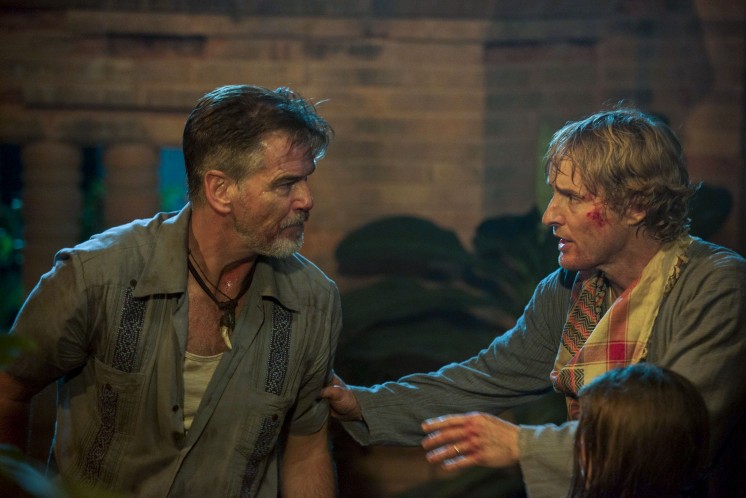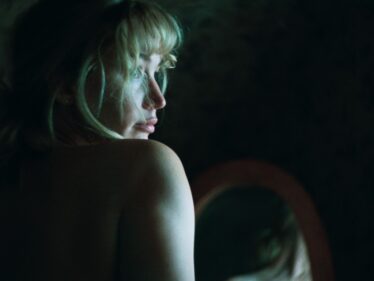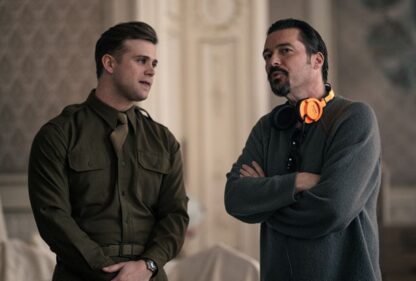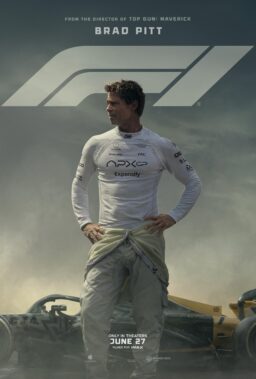“No Escape”is the name of
the new action-horror movie from director John Erick Dowdle and producer Drew
Dowdle (AKA The Brothers Dowdle), but also a fitting title for an overview of
their filmography. They’re moviemakers
that often work with small budgets and even tighter spaces, in stories of
survival of a limited amount of time. During the re-rise of found footage
movies in the late 2000’s, they trapped a TV reporter and her cameraman in a
virus-filled apartment building in “Quarantine”; in 2014,
they ventured five stories underneath the Catacombs of Paris to film “As Above, So
Below,” their found footage movie that placed viewers in unpredictable passageways of darkness, skeletons, and eerie mythology.
In their newest film, survival is still the endgame, but the
horror comes from a very human chaos; originally titled “The Coup,”“No Escape” takes place during a violent uprising. For reasons
unknown by American engineer Jack Dwyer (Owen Wilson), his wife Annie (Lake
Bell) and their two daughters (played by Claire Geare and Sterling Jerins),
foreigners and members of government are the number one target to insurgents
(Pierce Brosnan plays a mysterious foreigner who helps them along the way.) The
nation’s current turmoil is bigger than this family of ugly Americans and their
limited perspective, just as the depiction of tragedy within this movie is much
bigger than just an event. This movie is about when peace is no longer an
option, and often for the sake of the universal, primal motivation of
protecting family. Earning associations beyond clear-cut xenophobia, “No Escape” is a
thoroughly messy nightmare, but one that isn’t tied together by a mean spirit.
Having been gripped by the fitfully discomforting experience
of “No Escape,” I was excited to talk to the two brothers when they came to
Chicago. Along with sharing stories about the bizarre filming conditions in the
Catacombs, we dove into their latest project. They told me about how they didn’t want to make the film that was
either too pro or too anti-American, the careful line they walked to present
violence that was never desensitized, the other people they would have cast in
Owen Wilson’s shocking role, and more.
Where does your interest in putting audiences into tight
spaces come from?
John Erick Dowdle: I’d say it’s the intensity; the tighter focus. We like to work very
subjectively. In this movie, we’re always with our lead actor. We never cut away to a sky
view, or to the news, or to someone in Washington D.C., saying “We’ve
got to get these people out!”
Drew Dowdle: And we never have subtitles, because if [the
lead characters] can’t
understand it, we can’t
understand it. We were very strict about that.
JED: And we often go with shorter timelines. We like to
joke that no one changes their clothes in our movies. We like tighter time frames. Or the the tighter that
you make the whole thing, the more intense and visceral I think it feels.
First of all, this movie is very uncomfortable, but
productively so. it is uncomfortable, claustrophobic, but its motivations are
more complicated than good guys and villains. Did you want to specifically work
with that unease, that while watching it unfold an audience may fear that the film could ultimately be a xenophobic,
or mean-spirited venture?
DD: It was a concern.
JED: And we wanted to make sure that it didn’t feel like, “America’s awesome, rah rah!”
No, it never does. It certainly never does that.
JED: And that wasn’t the point for us. We spent a lot of time traveling in
places like this, and we didn’t want it to feel like it’s an “us
versus them.”It’s more like a family is caught in the
crossfire between two things that are happening.
DD: We didn’t want it to be too pro-American, but we didn’t want it to be too anti-American
either. We feel like this type of foreign policy is real, and that there are
sometimes these situations where there’s blowback. But Owen’s character, that’s above his pay grade, and he doesn’t know about any of that. He just
happens to be there working for a company. I mean, this could be a tsunami, it’s a crisis.
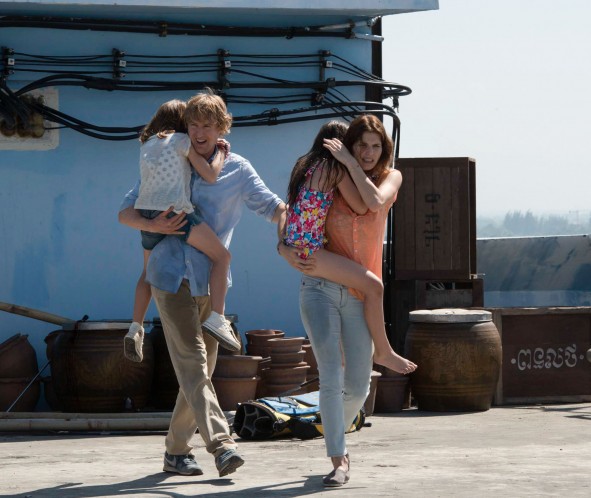
And that explains why you don’t have anyone from the coup sharing
their side of the story, or having a bigger part. And that the explanation
comes from Pierce Brosnan’s character, but only eventually.
DD: Yeah, and it comes very late.
JED: We wanted to learn what [the family] learns, as they
learn it. And in not cutting away, there’s the moments of real crisis where, when something crazy
happens, I feel like there’s that moment of “What’s even happening
here?”It takes a
while to figure that out.
DD: We like the rooftop scene, where Jack is trying to
figure it all out, and asks the other guests as to why this is happening. There’s a couple other clues there. To us,
9/11 was a bit of a reference point, because that day was so confusing. You
couldn’t get through to anyone on the phone.
And you’d walk past someone and overhear, “I heard the White House has been hit!”It was just a lot
of misinformation, and things like cell phones are off the table.
JED: And you’re stuck in your own perception. We felt it would feel a
lot more real, and put you in the Dwyer’s shoes.
Given the very human factor of the story, was there an
extra importance to making sure the violence doesn’t become desensitized? Part of the
film’s messiness
comes with what is not fully shown, such as a cutaway to the insurgents
executing people with a moving truck. The innuendo makes the violence even more
scarring, while not being as graphic.
JED: It is a fine line. And there’s a point at which it’s like, “That’s too much,”and you
distance yourself from it. That truck scene, that was a couple frame this way,
couple frames that way.
DD: And we did film [the truck] hitting them. But we what
we found more interesting is seeing how Jack was seeing this. And the same with
the guy who is dragged out of the hotel in the beginning. But we liked this
reaction shot of Jack, and what that means to him. That’s the much more interesting part.
JED: “It’s not the violence,” we kept saying
that in post. It’s what the violence means to the
Dwyers. It’s not the truck hitting someone, but
what does it mean to a father who can’t comprehend the killing? It doesn’t even make sense why they’re doing it, in which a lot of
insurgencies will run people over because it will save bullets, which are
expensive. But from a father’s point-of-view, seeing that, it leads to him defending his
family the way he does soon after that.
There’s no moment of violence in this movie where it feels
situated, or it feels old hat. When Owen Wilson has to take action at one point
in the film, it is a moment that is not rewarding, so to speak.
JED: Thank you.
DD: That was intentional. And that was obviously one of
the key moments when casting the script. And when casting Owen, we wanted that
moment to feel shocking. The violence is shocking, but what’s more interesting is the look to
Annie, and the moment that they share in the wake of this event, and she’s horrified. He doesn’t know how his family is going to look
at him now. That’s the really meaty part.
JED: What does this mean to a husband and wife when she
sees him kill someone like that? How does that change the dynamics? It’s what the violence means to the
family. That was a big moment, which Owen and Lake, I love what they did with
that.

And Lake too, when she has her moment; It’s brutal. These are not violent
actors! Was that an immediate pull for you guys, to find the least violent
people possible?
JED: We kept saying that our dream cast for this was Owen
Wilson, Jason Bateman, or Paul Rudd pre-“Ant Man.”
For mainstream movies, you’re breaking the mold of Owen Wilson
being a violent person.
DD: Owen was always the top choice.
JED: Because he seems like he’d be a great father. But wouldn’t it be shocking to see him kill
someone with his bare hands?
DD: And some actors with the same question, it’s like “No,
and no.”
If Pierce Brosnan was the father, that would make the
experience too comfortable.
DD: Yeah. Pierce is a great father, but it would not
shock me to see him killing someone.
JED: And Christian Bale, I love him, but I don’t think he’d pass the test. It wouldn’t shock me if he killed someone.
And what about Lake Bell? How did she get on board?
DD: That was really late, actually. We were going to make
this movie a year earlier. And we actually had a different actress cast as
Annie, and the movie fell apart. We had to rebuild it, and who we tested got
pregnant and was having a kid, right when we were shooting. So we were going to
Thailand and had this major role un-cast, and we had foreign sales to think
about. We had pre-sold a lot of foreign territories, so we needed someone at a
certain level that would equal what we have. We were going through a lot of
people, and we didn’t
know Lake Bell that well, quite frankly. But I was watching “In A World…” when we were in prep, and I said immediately to John that
she was perfect for Owen, and similar to Owen. But I think her representatives
were unsure at first, they said this was an unusual choice for her, but they
had her read it, and she liked it. We Skyped with her the next day, and we
closed the deal that week.
JED: And she was so great. On her Skype call she asked
questions like, “Can you drink the water there? Do I have to worry about
Malaria?” She had never
been to Thailand. But then she showed up, and we weren’t on set. She’s crawling through the mud under that
house, and later that evening a cobra came out from under it, which we didn’t know. And it was pretty real, but
she got into it. She did stunts. She was a total bad-ass. I’m sure some of that stuff wasn’t totally enjoyable, but she just went
for it.
DD: We have to credit her with the family feeling like a
real family. She embraced those girls so quickly. They adored her – they adored
Owen too – but the mom has to be warm, and this is people meeting each other
for the first time. A week before the shooting we did a lot of things with
them, we went to an elephant nature park, and asked the real mothers to hang
back. “Elephants are kinda scary, but make them go to Lake!”She was just so
good with those girls.

I’m curious – were the children in the story always daughters,
or did you ever consider writing them as sons? Why daughters?
JED: They were always daughters.
DD: We have two sisters. Our sisters are very much
modeled after them.
JED: At one point, we got pushed to ideas like, “Can you make them teenagers? Can you make them just one
kid, and make it a boy?”And there were
all of these things where we experimented with different stuff, but then we
just went back to our impulse. There’s something about two girls that they can interact freely
with each other, whereas a boy and a girl just wouldn’t be snuggled up with each other in
the same way.
DD: And at the end of the day, the biggest reason was
that we knew those girls, they were our sisters, and we could make them feel
real.
From the artistically conveying the Catacombs to the
explosions of an insurgency, sound is a huge part of your movies, and the
environments they trap viewers in. Are you thinking about sound even when
scripting?
DD: We brought our post-sound supervisor out to Thailand
to actually record rain, to walk around the markets recording sounds. He was
there for a while. Kelly Oxford is his name, and he’s a genius. When you’re on a tight budget, they’ll tell you that you don’t need a post-sound guy on set with
you, and we’re like, “Yes, you do!”
JED: We don’t want to use canned rain. It sounds
different when it’s hitting the tin roofs, and there’s a different quality in the texture.
We write a lot of sound into the script, and we think about that. Early on in
our very first movies, we would do our own sound design. I was a sound editor
as well, and we come from that. Back in film school, I was the sound guy.
DD: And we love post, a lot. We really geek out a lot.
After a handful of movies, we realize that we can do more creative post-work
during production, but you can’t go back and get it.
This film’s distributor, The Weinstein Company, isn’t exactly known for taking on
action-horror movies such as this. What do you think appealed to Harvey
Weinstein and others about this project?
DD: I think Harvey immediately got that idea of a father
trying to protect his family. It was never a discussion that it would be a
Dimension film. It was always Harvey. They were making a play for it, there was
a bidding war so we had some options, but we didn’t want this to be positioned as a
horror film. It’s got some horrific elements, but it
was important to us that, even though Dimension does great stuff and we grew up
on them, this was broader than that. I think he just got that primal hook.
JED: He’s been amazing. I hear that [working with Harvey] can go …[laughs]
We’ve all heard the stories about working for him, it’s all out there. But if you guys are
happy with what you’ve done, then all the power to you. Especially if you got
to have the cut you wanted.
DD: You know, [Harvey] had like three or four notes, and
they were great notes. Every one of them made it better.
JED: One note was that we had a little more of a
soundtrack, three songs throughout the movie that were really good. His note
was like, “They’re all good choices, but you’re in it; you’ve got your hand on their throats.
When you hear music with lyrics, you’re just a touch out of it. ”We resisted that note, but then we had
Marco Beltrami score those scenes, and we were sitting in Marco’s studio like, “This is amazing.” It was better and more immersive.
And lastly, I have to ask – if you’re running a film production with a
very small crew five stories underneath the Catacombs, how do bathroom breaks
work?
JD: In between takes, if I left, then everyone would
leave. So I go, “Okay, let me talk to …. “and then I
would run like hell to the top so that nobody else would take a break,
otherwise I’d lose an hour of the day, which nobody could afford. I was
in good shape at the end of that shoot.

